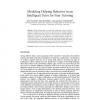Free Online Productivity Tools
i2Speak
i2Symbol
i2OCR
iTex2Img
iWeb2Print
iWeb2Shot
i2Type
iPdf2Split
iPdf2Merge
i2Bopomofo
i2Arabic
i2Style
i2Image
i2PDF
iLatex2Rtf
Sci2ools
136
click to vote
AIED
2009
Springer
2009
Springer
Modeling Helping Behavior in an Intelligent Tutor for Peer Tutoring
Giving effective help is an important collaborative skill that leads to improved learning for both the help-giver and help-receiver. Adding intelligent tutoring to student interaction may be one effective way of assisting students in giving and receiving better help. However, such systems have proven difficult to implement, in part due to the challenges of modeling productive dialogue in a collaborative activity. We present a theoretical model of good helping behavior in a peer tutoring context, and validate the model using student tutoring data, linking optimal and buggy behaviors to learning outcomes. We discuss the implications of the model with respect to providing intelligent tutoring for peer tutoring. Keywords. Cognitive tutors, peer tutoring, adaptive collaborative learning support
AIED 2009 | Artificial Intelligence | Intelligent Tutoring | Peer Tutoring | Peer Tutoring Context |
Related Content
| Added | 02 Sep 2010 |
| Updated | 02 Sep 2010 |
| Type | Conference |
| Year | 2009 |
| Where | AIED |
| Authors | Erin Walker, Nikol Rummel, Kenneth R. Koedinger |
Comments (0)

